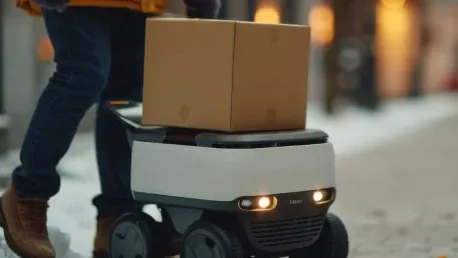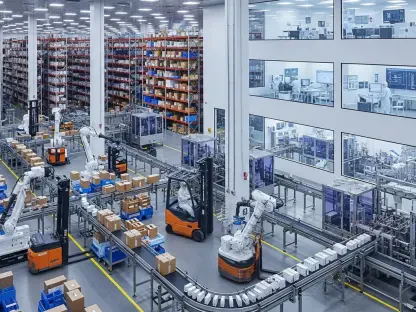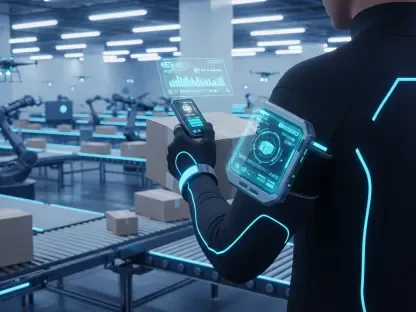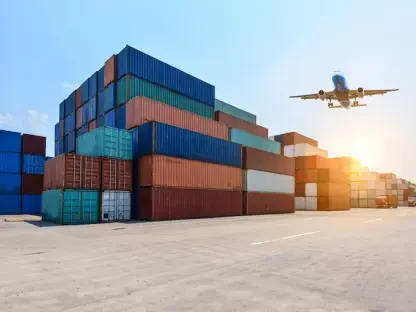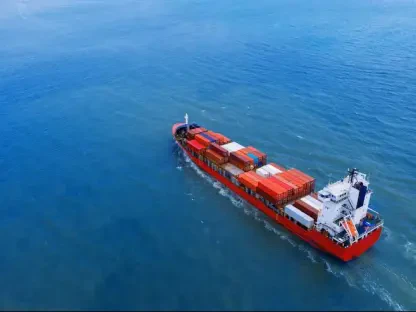DPD UK has announced an exciting expansion of its autonomous robot delivery service to Lincoln, a move that indicates the company’s commitment to innovation and sustainability. Having already seen success in cities like Milton Keynes, Raunds, and Bristol, this strategic rollout into Lincoln is set to modernize the delivery landscape further. With cutting-edge technology and an eye toward reducing environmental impact, DPD is making significant strides in the logistics industry. This expansion aligns with the increasing demand for efficient, reliable, and environmentally friendly delivery solutions.
Situated at the Lincoln depot at St Modwens Park, DPD’s autonomous robots are ready to serve the nearby village of Witham St Hughs. These robots are a key component of DPD’s broader strategy to integrate advanced technologies into their delivery network. The initial phase of deployment involves a meticulous mapping process, where the robots are remotely controlled and supervised to familiarize them with their delivery routes. This stage ensures that the robots can navigate their environment efficiently and effectively, setting the stage for fully autonomous operations once mapping is complete.
Strategic Rollout of Autonomous Robots
DPD UK’s autonomous delivery robots will now be stationed at the Lincoln depot at St Modwens Park, ready to service the nearby village of Witham St Hughs. These robots are part of DPD’s larger initiative to integrate advanced technology into their delivery process. The initial phase involves meticulously mapping the delivery routes. During this stage, the robots are controlled remotely and supervised to understand their environment and ensure optimal navigation.
Once mapping is complete, the robots can operate independently, boasting a runtime of up to 12 hours. They are designed to handle up to 30 deliveries per day within a one-mile radius from the depot, showcasing an impressive balance between efficiency and autonomy. By using a predefined network of footpaths, these robots ensure a seamless and reliable delivery process for local residents. This strategic rollout is a testament to DPD’s commitment to leveraging technology to improve logistics operations and meet modern delivery demands.
By incorporating autonomous robots into their logistics framework, DPD aims to enhance the overall efficiency of their last-mile delivery services. The robots are programmed to follow a predetermined network of footpaths, thereby minimizing disruption to local traffic and ensuring timely deliveries. This technology-driven approach not only optimizes the delivery process but also reduces the likelihood of delays, contributing to a more reliable and customer-centric service. With successful implementations in other cities, DPD is confident that Lincoln will benefit from this innovative delivery solution.
Operational Mechanics and Customer Convenience
The functionality of these robots is enhanced by a streamlined and user-friendly parcel retrieval process. Recipients receive SMS notifications when a robot is outside their property. Using a secure one-time pin code, they can easily retrieve their parcels from the robot. This method not only boosts the overall efficiency of the delivery process but also heightens security and convenience, providing a significant user experience upgrade. By integrating automated notifications and secure retrieval protocols, DPD ensures that customers can enjoy a hassle-free and efficient delivery experience.
Such advancements underline the company’s dedication to leveraging technology to improve service quality and customer satisfaction. The secure one-time pin code system adds an extra layer of security, ensuring that parcels are delivered accurately and safely. This feature not only enhances the customer experience but also reduces the risk of theft or misdelivery. By prioritizing convenience and security, DPD is able to offer a superior delivery service that meets the evolving needs of its customers.
Additionally, the use of autonomous robots in parcel delivery introduces a new level of reliability to the logistics chain. Unlike human drivers, robots are not susceptible to fatigue or human error, making them a more dependable option for last-mile deliveries. This increased reliability can lead to higher customer satisfaction rates, as recipients can trust that their parcels will arrive on time and in good condition. DPD’s innovative use of autonomous robots is setting a new standard for the logistics industry, showcasing the potential of technology to revolutionize delivery services.
Collaboration with Local Government
DPD’s initiative has garnered significant interest from Lincolnshire County Council, reflecting the growing importance of technology in urban planning. The council’s involvement is crucial for monitoring the trial and assessing its impact on local infrastructure. Cllr Richard Davies, the executive member for highways at Lincolnshire County Council, has expressed a keen interest in the trial’s outcomes, particularly regarding traffic and highway management. Collaborating with local councils not only facilitates smoother integration of such technologies into public infrastructure but also provides valuable insights for future urban mobility projects.
This public-private partnership exemplifies how coordinated efforts can pave the way for broader technological advancements in logistics and urban management. By working closely with local government bodies, DPD is able to address potential challenges and ensure that the deployment of autonomous robots is conducted in a manner that benefits the community. This collaboration also highlights the role of local authorities in fostering innovation and supporting sustainable urban development.
The involvement of Lincolnshire County Council in the trial underscores the significance of integrating advanced technologies into public infrastructure. As the council monitors the progress of the trial, they will be able to gather important data on the impact of autonomous robots on traffic patterns and road usage. This information can be used to inform future urban planning decisions and promote the adoption of similar technologies in other regions. The successful trial in Lincoln could serve as a model for other cities looking to modernize their logistics networks and enhance their urban mobility strategies.
Sustainability and Environmental Impact
DPD UK’s autonomous robots are not just a technological novelty; they represent a significant step towards sustainability in the logistics sector. The company has committed to reducing its emissions by 46% by the end of 2024, based on a 2020 baseline. This ambitious goal aligns with the broader industry trend toward greener practices. The robots complement DPD’s existing initiatives, such as their fleet of electric delivery vans and the use of hydrogenated vegetable oil in their HGVs. With autonomous robots in place, the company aims to further cut down on emissions, contributing to a significant reduction in their overall carbon footprint.
This multi-faceted approach highlights DPD’s commitment to environmental stewardship alongside technological innovation. By investing in sustainable technologies, DPD is positioning itself as a leader in the green logistics movement. The deployment of autonomous robots represents a tangible step towards achieving their emissions reduction goals, demonstrating the potential of technology to drive positive environmental change. This commitment to sustainability sets DPD apart from its competitors and underscores the company’s dedication to creating a greener future.
The broader implications of adopting autonomous robots in logistics extend beyond individual companies. As more organizations embrace these technologies, the cumulative effect could lead to a substantial reduction in greenhouse gas emissions within the industry. This shift towards greener practices is essential for mitigating the environmental impact of logistics operations and supporting global efforts to combat climate change. DPD’s leadership in this area serves as an important example for other companies to follow, showcasing the benefits of integrating sustainability into business operations.
Industry-Wide Shift Towards Automation
The deployment of autonomous delivery robots marks a transformative shift in last-mile logistics, a critical sector of the supply chain. By adopting these robots, DPD is setting a precedent for blending efficiency with cost-effectiveness while minimizing environmental impact. This shift is reflective of broader trends within the logistics industry, emphasizing automation as a key driver of future advancements. Autonomous delivery systems promise to reduce traffic congestion and enhance delivery efficiency, particularly in urban settings. Their successful integration into everyday logistics could prompt changes in public policy and regulatory frameworks, encouraging widespread adoption.
The ultimate goal is to create a sustainable, efficient, and responsive logistics network that can meet the evolving demands of modern urban environments. The introduction of autonomous robots into the delivery process showcases the potential of automation to revolutionize the logistics industry. By leveraging advanced technologies, companies like DPD can improve operational efficiency, reduce costs, and enhance customer satisfaction. This shift towards automation also aligns with the growing demand for faster and more reliable delivery services in an increasingly digital world.
As the logistics industry continues to evolve, the adoption of autonomous delivery systems is likely to become more widespread. Companies that embrace these technologies early on will be better positioned to capitalize on the benefits of automation and maintain a competitive edge in the market. DPD’s innovative approach to last-mile logistics sets a new standard for the industry, demonstrating the potential for technology to drive meaningful improvements in efficiency, sustainability, and customer experience. The success of DPD’s autonomous robot initiative in Lincoln could pave the way for similar advancements in other regions, ultimately transforming the logistics landscape on a global scale.
Future Implications and Recognition
DPD UK has revealed an exciting extension of its autonomous robot delivery service to Lincoln, highlighting the company’s dedication to innovation and sustainability. Building on success in cities like Milton Keynes, Raunds, and Bristol, this strategic move into Lincoln aims to further revolutionize the delivery industry. By leveraging advanced technology and focusing on reducing environmental impact, DPD is making substantial progress in the logistics sector. This expansion meets the growing need for efficient, reliable, and eco-friendly delivery solutions.
Based out of the Lincoln depot at St Modwens Park, DPD’s autonomous robots are set to serve the nearby village of Witham St Hughs. These robots play an essential role in DPD’s larger strategy to incorporate advanced technologies into their delivery services. The initial deployment phase involves a detailed mapping process, during which the robots are remotely supervised to get accustomed to their routes. This stage ensures that the robots can efficiently and effectively navigate their operating environment, paving the way for fully autonomous operations once the mapping is completed.
